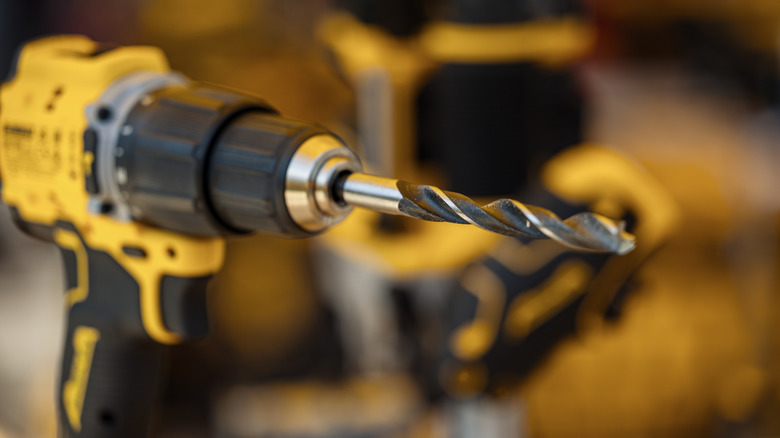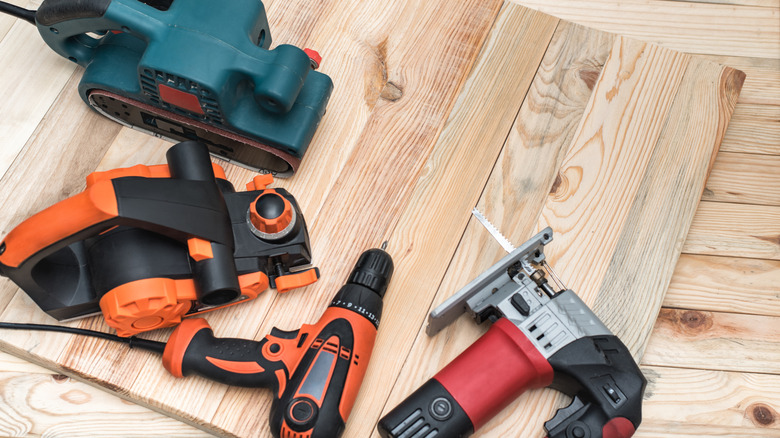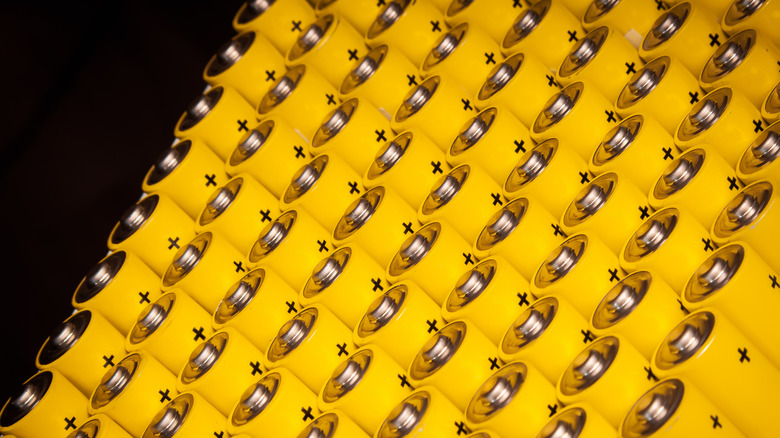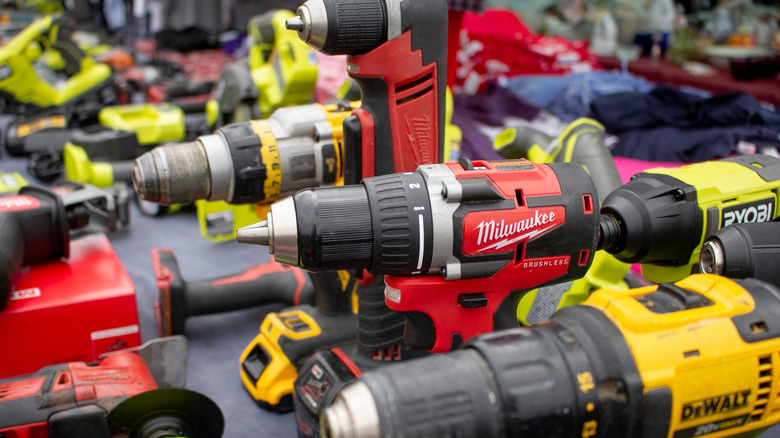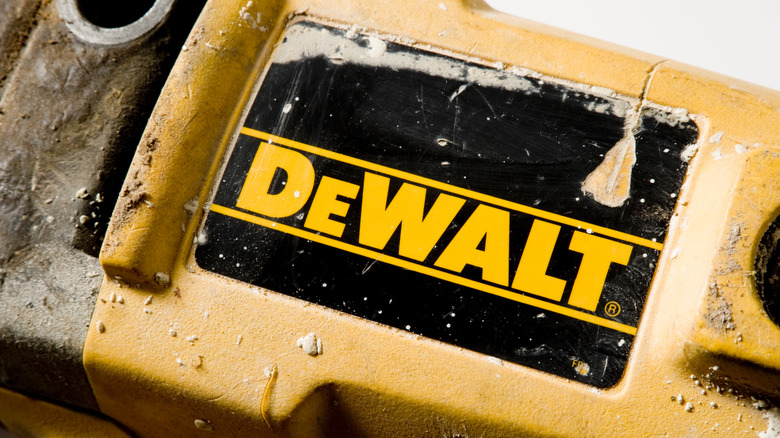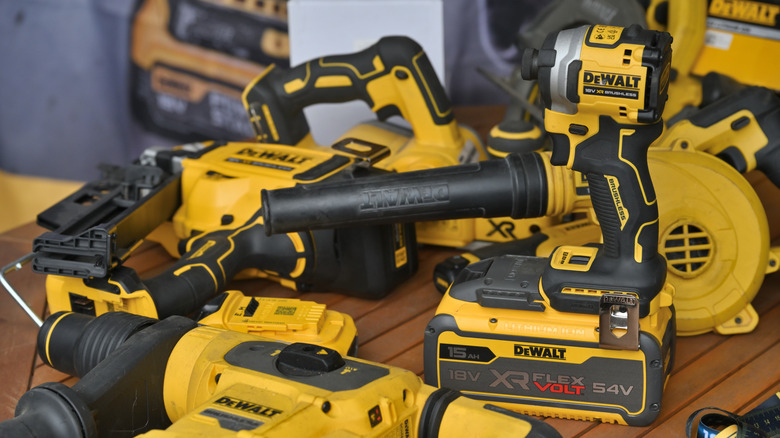5 Important Things To Consider Before Buying DeWalt Tools
We may receive a commission on purchases made from links.
DeWalt is a name that virtually all tool users know. DeWalt is among the best hand tool brands on the market and makes highly sought after power tools, too. The company's yellow tool bodies are easy to spot, and they're consistently found in home renovators' toolboxes, as well as in professional settings. DeWalt equipment is prized for its durability, performance, and customer care services.
However, deciding which tool brand to invest in isn't simple. There's a lot to think about before jumping into customer loyalty to a single toolmaker. In large part, this is due to the cordless tools that essentially every brand delivers nowadays. Cordless equipment runs on a brand's proprietary battery setup, and they don't feature interchangeability. However, it's worth noting that a number of strangely-named Amazon brands and others have developed tools that are compatible with DeWalt batteries, and the same is true for other brands.
Buying into the DeWalt battery landscape is only one part of the decision tree, but it's an important one. For hand tools and accessories, the choice is a little simpler, but among its power tool range, these five things are essential to understand as you peruse the market.
DeWalt is expensive but worth the price
Among the most important things to understand about the DeWalt brand is its pricing. When compared to some of its mainline competitors, DeWalt can be found at a roughly similar price point. But among the dozens of competing brands out there, DeWalt equipment tends to be relatively high-end. Across major power tool brands that deliver all kinds of tools, DeWalt is often a leader, justifying that price jump for some. Ryobi equipment, for instance, provides good user functionality and offers a considerable range across its catalog. But DeWalt tools are almost always going to outperform their Ryobi equivalent, and cost more as a result.
If you are a tool user with a tight budget, DeWalt isn't the brand for you. However, professional users and home users who want a more robust experience tend to gravitate toward brands like DeWalt. For example, DeWalt's top-of-the-line, 3-speed 20V Max XR Hammer Drill/Driver can be found on Amazon for $239. A Skil 20V PWR CORE Hammer Drill is listed for $150, and that one includes batteries and charger. The DeWalt drill is lighter and introduces a more feature-rich experience but costs significantly more.
The 12V and 20V battery lines are the most popular
DeWalt's cordless tools are likely its most interesting assets for the typical home improver. Much like numerous other brands in the market, DeWalt offers a few battery platforms to power its tools. The brand built its tools on three primary battery systems: 12V, 20V, and 60V ranges. Understanding the difference is obviously important, but it's worth noting that routine power tool usage will focus on either the 20 or 12 volt offerings.
DeWalt follow suit when it comes to its power tools, building a mainline range of equipment on a 20V battery platform, replacing the older 18V line, and delivering scaled down models that run on 12V power systems, called "Xtreme Sub-Compact." These are the main areas to consider when thinking about investing in a new DeWalt tool. If you need more power and don't mind having less choice, however, you could consider the 60V line.
The 60V solutions from DeWalt are worth exploring if you are someone who engages in outdoor landscaping work or may require larger tools to get your projects done. The 60V battery packs deliver juice to DeWalt's heaviest equipment. Within this part of the catalog you'll find concrete-busting jackhammers, compaction tools, and of course outdoor power equipment like lawn mowers, chainsaws, and hedge trimmers.
DeWalt's biggest rival is Milwaukee, but they are similar brands
DeWalt is among the primary tool brands that users invest in when they want the best experience possible. Although, the yellow tool bodies aren't the only equipment thought of in this light. DeWalt is often placed alongside Milwaukee gear when talking about semi-premium tool brands in this price range. Both tool brands carved out a significant customer base for themselves with the help of comprehensive power and hand tool offerings, and each one provides professional level equipment across their catalogs. With significant accessibility for consumers, it's only natural that DeWalt's main comparison would come from another historic American tool manufacturer.
I have personal experience with both solutions, having initially bought into the Milwaukee battery ecosystem. Roughly two years ago, I came across a DeWalt drill replacement kit for an old unit that was deeply discounted and couldn't pass it up. Since then, my DeWalt collection has grown a bit faster than the stable of Milwaukee tools in my shed. As a user of both platforms, it has become abundantly clear that preference for one brand over the other is entirely personal. Generally speaking, DeWalt will feature higher speed ratings, but Milwaukee typically generates better torque. DeWalt gear could be considered the better choice for precision-oriented work, while Milwaukee is great for its sheer power. However, the difference shouldn't be so wide as to compel someone to switch their entire arsenal from one group to the other.
The warranty is good but not the best in the business
DeWalt provides a 3-year limited warranty on its tools, alongside a 90 day money-back guarantee and a year of free service on its equipment. These are all reasonable figures and should be enough to make you confident in your purchase. Warranties are great to have for when the worst happens, but with premium tools like these, you don't really have to worry about damaging them. Unless you're beating the life out of them every day, they will almost certainly last far after the warranty is over, factory defects aside. Power tools are built to last, and plenty of DeWalt equipment features upgraded gearboxes, brushless motors, and other technological enhancements that seek to extend their lifespan even more.
With that being said, it's worth recognizing that DeWalt's coverage is pedestrian compared to some others. Skil and Milwaukee both offer a 5-year warranty. At the top end of the range, Hilti delivers a 20-year warranty window. Metabo HPT offers a 'lifetime of the tool' warranty (as long as the brand continues making the tool), and Flex provides lifetime coverage, including three separate battery exchanges on the same original purchase. The reality is that a 3-year warranty alongside DeWalt's other guarantees is a nice addition, but it's not something that buyers will necessarily get excited about.
There are over 250 20V Max tools
One crucial thing to consider when selecting any tool brand is what you will use their products for. If you need a particular tool that falls within a niche category, finding a brand that makes the equipment can help weed out options. Every power tool manufacturer will make a few variants of drills, circular saws, and even more specialized implements like oscillating multitools. These have become commonplace, but there's a lot more depth to explore. For instance, Milwaukee is possibly the only brand making battery-operated soldering irons that run on its primary power system. Similarly, the Ryobi rotary tool hobby station is something of an outlier. If you need a particular tool model now or in the future, finding a brand that offers it is a great place to begin.
On the other hand, if you aren't in need of a specific tool but want to have options in the future, it's important to consider the breadth of tools that a brand offers. DeWalt is a robust choice in this sense. Among its 20V Max tools, DeWalt offers more than 250 individual pieces of equipment. This includes all the usual suspects like impact drivers and reciprocating saws, but it expands to include fiber cement shears, heat guns, pipe deburring tools, grease guns, and more. With a range this wide, you can expect to find whatever you might need in the future without having to invest in a new brand's batteries.
